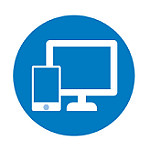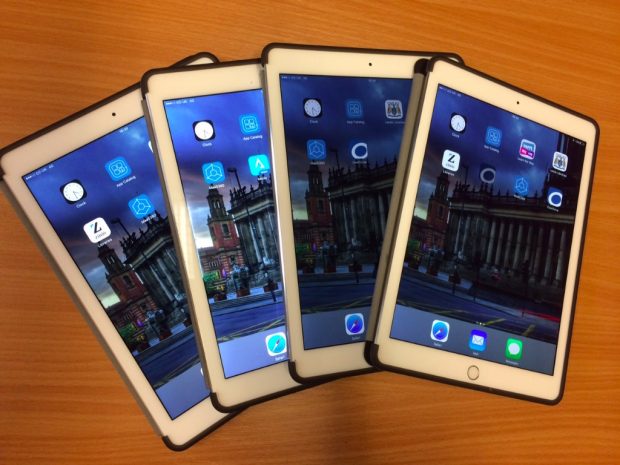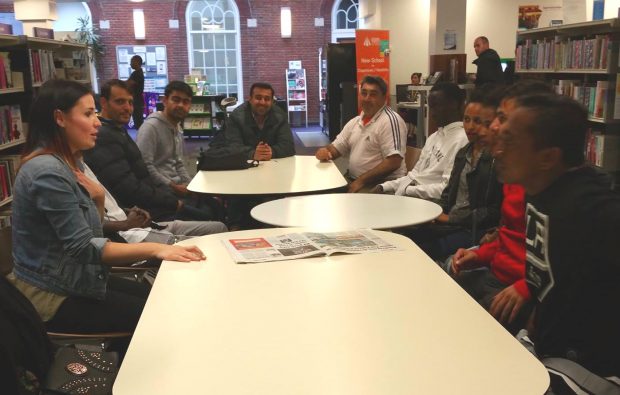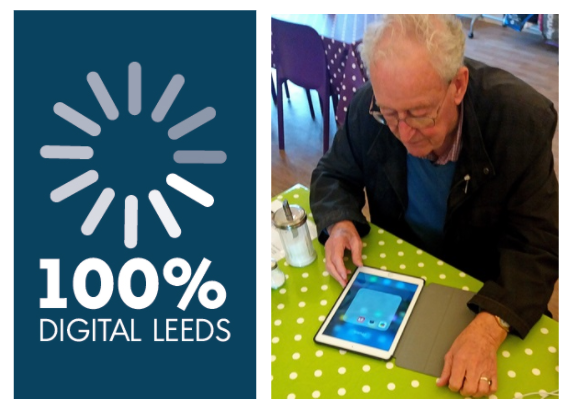 [Editor’s note: Guest post written by Ian McArdle, acting Digital Engagement Librarian for Leeds Libraries, who has been loaning tablets to community organisations throughout Leeds and working with them directly to boost digital inclusion.]
[Editor’s note: Guest post written by Ian McArdle, acting Digital Engagement Librarian for Leeds Libraries, who has been loaning tablets to community organisations throughout Leeds and working with them directly to boost digital inclusion.]
For the last few months Leeds Libraries have been working on a pilot scheme aimed at boosting digital inclusion in the city. Our tablet lending scheme aims to show people the positive changes that can be made to their lives from being online.
The start: Connect-Ability scheme
In 2016, our Connect-Ability scheme (supported by the Good Things Foundation’s Digital Inclusion fund) meant that disabled people across the city were able to receive support and training to get online for the first time. We loaned iPads to people in our communities who struggled to access library services in the ‘traditional’ sense (i.e. visiting a library to borrow books, find information, use a computer) and organised sessions with them to show them how to use the devices: searching the internet, downloading e-books and using apps.
As a proof of concept, Connect-Ability showed the benefits of tablet lending. But it also showed the difficulties of running such a scheme on a large scale. To safeguard our customers’ data, staff had to factory reset each tablet between each loan. This also meant that staff had to reinstall the apps we thought would be most useful or those we wanted to promote. We knew this would be an unsustainable delivery model as we increased the number of tablets available for loan.
Technical solution
This year, we have been working closely with O2 and colleagues across Leeds City Council to develop a technical solution which will make the tablet lending scheme work better. As a result, the administrative processes required to manage the scheme are now more straightforward and less staff-intensive.
We set up our iPads with Apple’s Device Enrolment Program (DEP) service, so we’ve been able to manage the devices and configure a specific image that is deployed to each device when switched on – even after a reset to factory settings.
Every time they are switched on, these devices automatically contact Apple to see if there is a DEP
registration that matches their serial number. If there is, the tablet receives the details of the specified third-party Mobile Device Management (MDM) service and then enrols the user into the management system.

All of the useful apps we have pre-loaded onto the devices automatically reappear when reset, and do not need to be downloaded again onto each device. We also have our own App Catalog (like a scaled down App Store) so users can download popular apps without having to set up their own Apple ID first.
The MDM also means that if the tablet gets lost or is stolen, we can arrange for the device to be wiped remotely, and ensure that users’ data is kept secure. Fortunately that hasn’t happened, but we are prepared for it nonetheless!
Customers of the new scheme
Our tablet lending scheme is specifically aimed at groups who are more likely to be digitally excluded – whether that’s down to a lack of skills, confidence, motivation, or sustained access (i.e. the cost of buying a device and internet connection). We are removing these barriers to bridge the gap between those offline and those online.
We have worked with 3 very different organisations across Leeds to pilot this phase of our tablet lending scheme. We are testing the scheme with different groups of people who have a variety of reasons for wanting to be online:
- RETAS (Refugee Education and Training Advice Service) with a class of ESOL students - using the tablets to develop their English skills and to stay connected with family and friends
- OPAL (Older People’s Action in the Locality) with older, often socially isolated people in the north west of the city - using the tablets to follow their interests and learn new skills, look up health information and keep in touch with relatives using Facetime and Skype
- Children’s Services with young people leaving the care system - using the tablets to apply for jobs and prepare for further education courses

One of the people who borrowed a tablet as part of this scheme admitted that she struggled to get to her local library and stay there to study English because of looking after her two young children. The ease and portability of the iPad has really helped her out and enabled her to learn how to use online resources and develop new skills more easily and conveniently. Another RETAS user was able to use the Maps app to help find his way around the city and get to appointments. Their tutor thought the iPads had been a big help to the class, saying “I know the learners really benefited from loaning the iPads from you and it would be great if we could participate in this scheme in the new academic year.”

National research suggests there are around 90,000 adults in the city (14% of the population) who lack basic digital skills. These people are also more likely to be disabled, older, unemployed, on a low income or have low literacy and numeracy levels. These are the very people who would most benefit from being digitally included. Our ambition for 100% Digital Leeds is a city where everyone has the opportunity to get online and can find the support they need to develop their digital skills and confidence. Many of these people are classed as ‘limited users’, meaning they are online but only making use of the internet in a limited way. We know that helping them to become digitally included will bring wider social benefits: helping them to be more informed, more confident using online tools, feeling more independent and less isolated.
Next steps
We’re currently looking at how we build upon the success of the pilot scheme to reduce the digital divide even more. The next steps are to acquire more iPads and spread the word, working with organisations and volunteers to digitally engage those who are offline or only using the internet in a narrow way at the moment, and make library services more accessible to everyone.
To keep up to date with activities in Leeds libraries, follow them on twitter.
-----------------------------------------------------------
Please note, this is a guest blog. Views expressed here do not necessarily represent the views of DCMS or the Libraries Taskforce